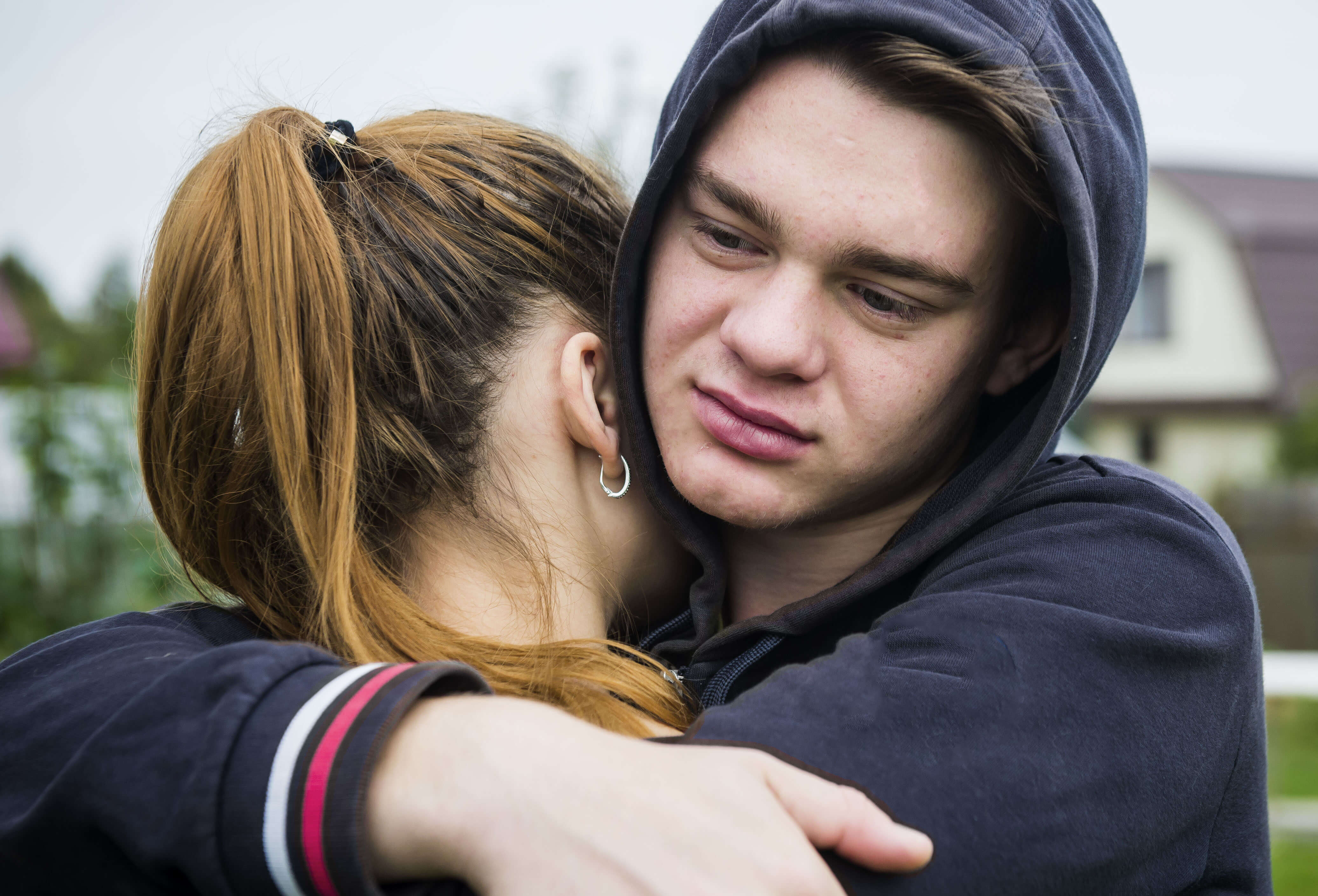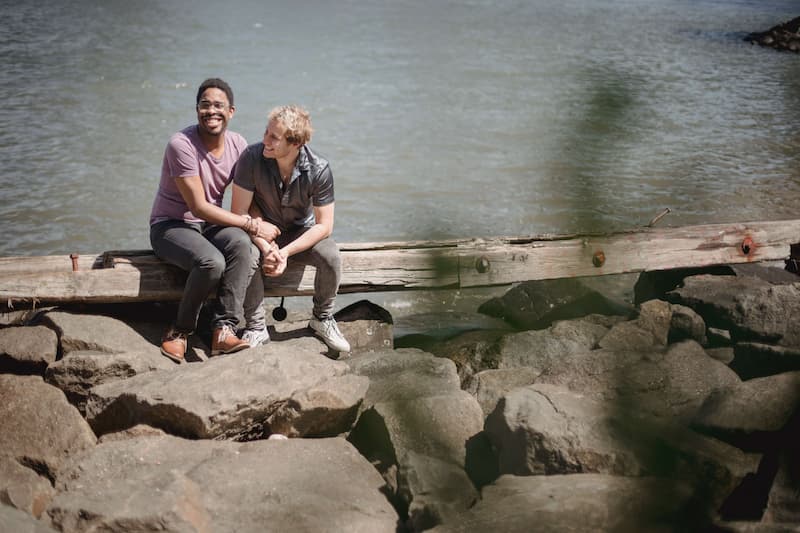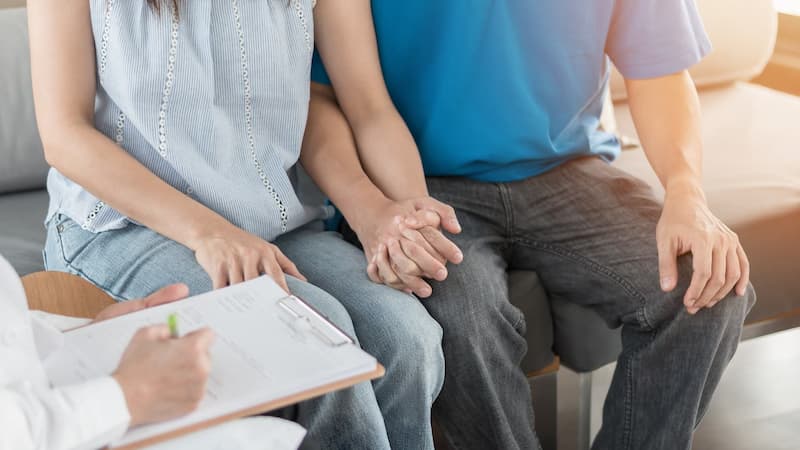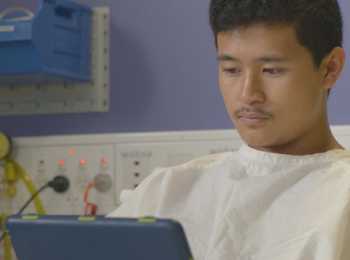Contents
Part 1
Relationships with your partner's family
Making decisions about the future
Wait... did you say “cancer”?
A guide to supporting your partner when they have cancer
Your reaction
Everything is ticking along as normal and then BOOM! Your world is tipped upside down. The person you love has cancer.
- You might be wondering, now what?
- What am I supposed to do, say, what does this mean for me, for our relationship?
- How am I supposed to deal with this?
- Do I even want to deal with it? (And that thought is OK too)
Being the partner of someone who has cancer is not easy (Oh really???). It can be scary, confusing and throw you way out of your comfort zone. This isn’t exactly what you may have signed up for. By now you may have already realised that your partner is going to experience a truckload of changes and is facing a whole lot of really big challenges. But so will you.
You might be really surprised at your reaction to having a partner diagnosed with cancer. You might be shocked, puzzled, totally freaked out or you may feel nothing at all. It can be very difficult to watch the person you love struggle through treatment or go through pain. You are not expected to make everything better. It’s OK to be lost for words, not know what to do and be freaked out by the whole thing.

Finding out the person you love has cancer can be very stressful and you may experience worrying thoughts and difficulty concentrating, as well as physical reactions such as fatigue, nausea and headaches. It can also bring up some huge scary questions about health, life and death that you may not have thought much about before. It can take some time to process what this all means for you, your partner and your relationship.
There will be a lot of focus on your partner who has cancer. You may want to yell – hey what about me? Well this booklet is for you.
If your partner hasn’t already got a copy of Now What…? A young person’s guide to dealing with cancer, it’s a good idea to get hold of one. It has heaps of information and facts about cancer, causes, treatments, what it’s like to be a young person diagnosed with cancer, practical stuff like money and legal information.
You’ll probably find the Now What…? A young person’s guide to dealing with cancer book useful too – it can help you to understand what your partner might be thinking, which in turn can help you understand how to be the best support you can be.
You may both be surprised that you share a whole lot of similar feelings. What is important is finding a way to communicate with each other. It’s really important for you to take care of yourself, find ways together to deal with this and to manage it all the best way you can.

Telling people
There is nobody that you have to tell, but letting people know can make things a little easier for you. Who you tell is up to you but you also need to be aware of what your partner wants and thinks is OK in terms of sharing the news.
Sometimes this can cause a bit of conflict if you have different ideas and feelings about telling people. You need to respect your partner’s wishes but also find ways to get support for yourself from family and friends. Letting friends know can be really tough – sometimes you have to worry more about how they are reacting than how it is for you. There is a good section in Now What…? A young person’s guide to dealing with cancer that has tips on telling people (pages 95-96).
“To those who are just learning their partner is sick: I know it feels like this time will never pass and that you are stuck in a awful circle of bad news and hospitals and more bad news but this time will pass. And no matter how bad it seems it’s still possible for both you and your partner to smile and have a good time, the willingness and attitude to believe that good things can happen even at the worst points is what I think is most important.
Loss of reality, feeling as if everything had come to a standstill e.g. time, work normal thought processing, confusion, sickness in stomach.”
(Luke, 22 years whose partner has cancer)
Life turned upside down
Supporting someone through a cancer experience can be incredibly tough and it’s likely that it will have a big impact on your life, including your relationship, your wellbeing, your study or work and how you spend your time.

Your relationship
Some couples find that going through something like this together strengthens their relationship and reinforces their closeness and commitment to each other.
But living with cancer places an enormous amount of pressure on everyone and problems can arise even between the most loving couples. You may want to make things better for your partner and feel helpless and frustrated when you can’t make it all go away. With all the stress of what’s happening, you might not be communicating as well as you used to. Sometimes when you are close to someone you expect him or her to be able to read your mind and know what you want.
Your partner might get upset or angry with you if you don’t know the best way to handle things. And you may get upset or angry with your partner because they don’t seem to understand what you are going through. There are all sorts of changes that might happen to your relationship. Don’t take things personally – realise that often people may disagree and argue because they’re just not coping.
“When I felt things were too hard to put into words, I kept a journal throughout it all, and would let Peter read it when I didn’t feel I could talk about whatever was going on for me openly.”
(Louise, 24 years whose partner had cancer)
Things that might happen:
- You might struggle with how to respond and start to get a little distant and avoid talking about their cancer. You may even try to block it all out. This can really hurt.
- You may go into overdrive and try and protect your partner and not let them do anything for themselves. This can make them feel frustrated and helpless.
- You may feel like you can’t handle the situation and that you can’t give them what they need right now. This may make you feel sad and guilty.
- You may find that your partner’s attitude towards things and their outlook on life changes because of their cancer experience, and this can impact on your relationship. Your outlook on life may also change.
- You might start to worry that you and your partner’s feelings and attitudes about their cancer are not in sync. One of you might be feeling hopeful while the other might be more pessimistic. This can sometimes make it hard to make decisions about treatment or plans for the future together.
- You may worry that your partner thinks that you are just sticking around because you feel sorry for them and bailing now would be a really slack thing to do. Your partner may not feel that they have the right to dump this on you so may also start to distance themselves and shut you out, thinking that they are protecting you. Find ways to let them know that it’s your choice to stick around.
Hiding emotions creates distance between partners. It’s normal that you and your partner won’t always feel the same way (but that was probably true before they had cancer). Talk about differences and respect each other’s feelings without criticism or blame.
Both of you may be a bit scared about how treatment, side effects, surgery and scars will impact on your sexual relationship. Your partner may be scared that you won’t find them attractive anymore and you may also be scared that you will find it difficult to deal with the physical changes that result from their cancer treatment. You may be scared that you will hurt them in some way.
Being really tired, being in pain and some medications can make your partner lose interest in sex. Their physical ability to have sex may also be affected. You may find that the stress and strain of caring for your partner also impacts on your interest in having sex. That’s the bad news.
Remember: Everyone responds to stress in a personal and sometimes unpredictable way.

Let's talk about sex
The good news is that unless the doctor tells you otherwise, there is no reason why you can’t have sex while your partner is undergoing treatment.
(Although if they are bald, vomiting, stuck in hospital and generally feeling unwell, sex may be the last thing on their mind).
The other thing to remember is that there are other ways to show that you care about each other and to have an intimate relationship.
Some suggestions are:
- Stay physically connected; holding hands, massaging, hugging, and kissing.
- You may be embarrassed talking about things to do with sex, but it’s really important to find a way to discuss it with each other.
- Just spending time together – going out for breakfast or lunch, the movies or just cuddling on the couch.
- The most important thing is to let your partner know that you still find them attractive.
“I often wondered if regularly asking how she was feeling was more of a nuisance than a help particularly in the early stages of treatment. I did however continue to ask and began to notice patterns in how her body reacted and could then limit the questions.”
(Luke, 22 years whose partner had cancer)
Things that can help:
- Try to talk about everyday things – it doesn’t always have to be about cancer.
- Do something special for each other; it can be something really simple.
- Plan time together that doesn’t revolve around cancer, hospitals or Drs’ visits.
- Being able to laugh and cry together is what it’s all about.
“Taking things slowly and asking her how different things cause her pain/discomfort.
I think it’s very important to talk to your partner about their stresses and pressures as well as yours. Topics we found hard basically included anything negative e.g. side effects of treatment/ illness and the possibility of treatments not working. The best advice I could give is not to focus on these things until they happen (much easier said than done I know).”
(Luke, 22 years whose partner had cancer)
Relationships with your partner's family
Just as it’s hard for you to see the person you love sick and in pain, your partner’s parents and siblings will also be having a tough time. It’s the role of parents to protect their kids (no matter how old they are) and when they get sick, this protective streak can sometimes go into overdrive.
If the two of you have been used to doing your own thing, taking care of yourselves and making your own decisions – having all of this challenged might take some negotiating. A lot will depend on the status of your relationship, your living arrangements and also the relationship that both of you have with your partner’s family.
If you are not living together, understanding your role might take some time to figure out. You may be relieved that you don’t have to be the main support, or you may feel a little sidelined.
Remember: You may have to advocate on behalf of your partner and yourself. When making decisions about the cancer and its impact, it’s your partner’s needs, wants and wishes that are the
Making decisions about the future
A cancer diagnosis can fast track the need to make decisions about certain issues that both you and your partner may not even have thought about before.

Fertility
Some cancer treatments can cause infertility (a person’s inability to have a child) for males and females. Before your partner begins treatment they may need to make some decisions about taking steps to preserve their fertility.
While you may not want to think about it, your partner might have to.
Even if you are part of these discussions it doesn’t mean that it ties you into the relationship for the long haul, but these are really important decisions for your partner to make in order to give them choices in the future – whether that is with or without you.
Maybe Later Baby – a guide to fertility for young people with cancer (Available from Canteen) is a book that has heaps of information that can help you and your partner discuss the issues and make decisions (see the ‘Where to get more information and help’ section on page 28).
Breaking Up
Being faced with something as big and as serious as cancer can be very scary. It can put all sorts of stresses and strains on you and your relationship. You may question whether you are prepared to hang in there and be part of your partner’s cancer experience.
You might feel very pressured to stay if you don’t think you can or want to. Staying with someone just because you feel sorry for them (or out of guilt) is not a good basis for a relationship – not for you or your partner.
It’s OK to decide that this isn’t what you signed up for and that you can’t be the support that your partner needs right now. But many people feel that it’s important to try and make an effort to make things work and support your partner through this.


















